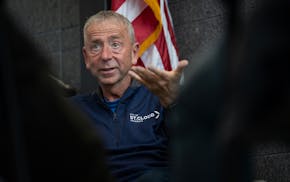Six months of partisan crossfire and troubling revelations about Lt. Gov. Carol Molnau's leadership of Minnesota's Department of Transportation have led to a clear conclusion: Minnesota needs a new transportation commissioner -- a nonelected, nonpartisan, respected professional in that field.
Charging the GOP governor's running mate and former legislative ally with leading an agency in which politics ought to play little or no role was considered an experiment when it began in 2003. The experiment has failed. It ought to end for Minnesota's sake -- and, arguably, for Molnau's too. A new role might give her a chance for political rehabilitation.
The partisan suspicion that has hung over MnDOT since Molnau's appointment has grown deeper since the Aug. 1 Interstate 35W bridge disaster. The situation is casting an unfortunate shadow on MnDOT's previously bright reputation for politically untarnished professionalism -- something Molnau herself lamented in an interview last week.
"I really do hate it when it becomes so political that it negatively impacts a lot of good folks" in her agency, she said. She did not acknowledge, but should, that as long as someone in line to be the state's next governor sits in the commissioner's office, a barrage from political opponents will just keep coming.
Some DFL complaints about Molnau's MnDOT service smack of overreach. For example, attempts to tie her decisions directly to the collapse of the Interstate 35W bridge remain mostly rooted in speculation.
But Molnau has given her foes real ammunition, too:
• On her watch, the agency experienced its first budget shortfalls in modern times. The Crosstown Hwy. 62 project was delayed for a year because funds were so short that contractors were asked to front the startup money -- and refused.
• Her decision to seek new bids on a portion of the Wakota Bridge project in the wake of a design error led to a 14-month delay and higher costs, with the original contractor still doing the job.
• Agency management was found lacking by two recent reports: by the legislative auditor, in the case of fired emergency management director Sonia Morphew Pitt, and by an internal audit that found $140 million in cost overruns since 1999.
Those matters are past. What isn't is how Molnau's stardom in her party's no-new-taxes firmament is damaging the department's credibility. MnDOT is no longer trusted at the Legislature to tell the whole truth about its financial needs, lest it add up to a case for higher taxes. It's not trusted by many Minnesotans to tell the whole story about how best to keep them safely and efficiently mobile in years to come, since a full forecast might sound like a call for bigger government.
MnDOT's own numbers indicate that Minnesota should spend an additional $2 billion a year to keep the system functioning at current levels. But MnDOT's commissioner applauded as Gov. Tim Pawlenty twice vetoed bills that would have come less than halfway in closing that gap -- charging that they were too large.
Pawlenty -- or the lieutenant governor herself -- would do well to own up to the problems inherent in Molnau's dual assignment, and change her portfolio. Doing that, as the new legislative session begins, would be a widely acclaimed move. It would show a willingness by the administration to put MnDOT's reputation and effectiveness ahead of personal desires or partisan alliance. It would disarm senators who are spoiling for a fight over Molnau's confirmation, and improve chances for a bipartisan accord on the increased transportation funding Minnesota badly needs.
But if the administration won't change MnDOT's leadership, the Senate must, by denying her confirmation. In so doing, it should send a message to this and future governors: Lieutenant governors should not head critical state agencies.

Kudos to St. Cloud's longtime mayor
Readers Write: Ethnic studies curriculum, public notice laws, student protests


